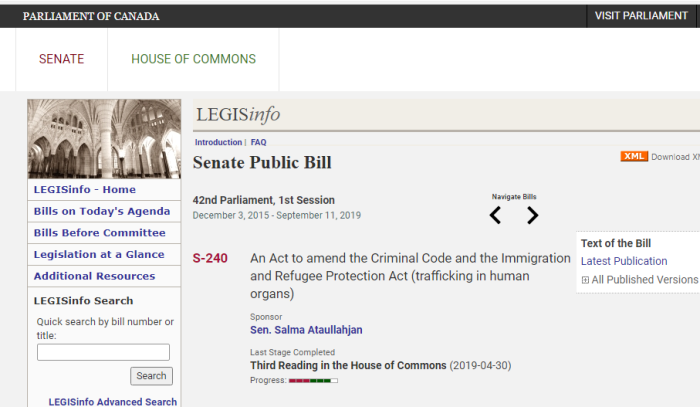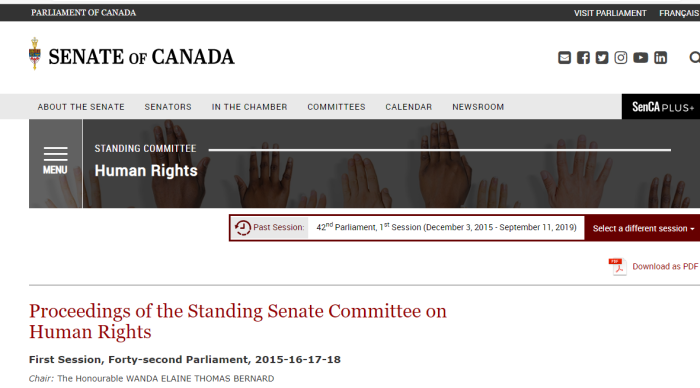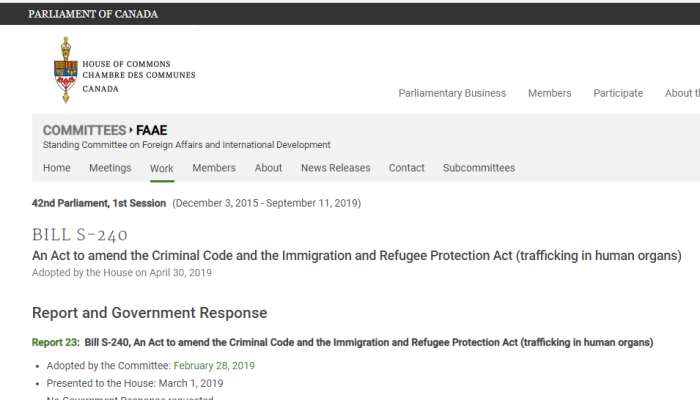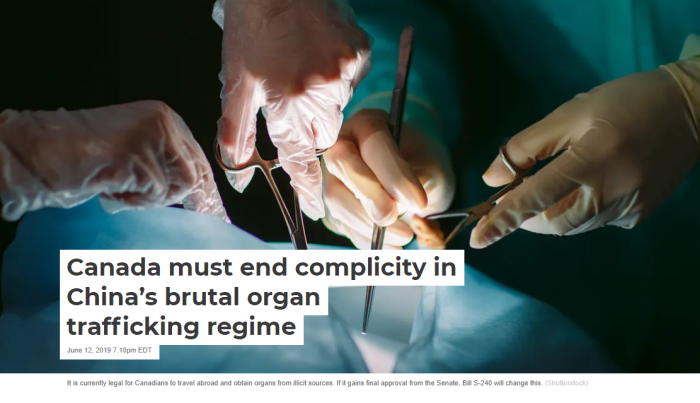
Senate Bill S-240 would make it a crime to go abroad for the purposes of receiving trafficked organs. The rationale being, if it’s illegal here, leaving to do it should be treated the same way. In part, Bill S-240 has been in response to revelations that China has been involved in forced organ harvesting.
This is the 4th version of the idea to come forward. Yet again, it did not pass before the session ended.
1. Trafficking, Smuggling, Child Exploitation
Serious issues like smuggling or trafficking are routinely avoided in public discourse. Also important are the links between open borders and human smuggling; between ideology and exploitation; between tolerance and exploitation; between abortion and organ trafficking; or between censorship and complicity. Mainstream media will also never get into the organizations who are pushing these agendas, nor the complicit politicians. These topics don’t exist in isolation, and are interconnected.
2. Important Links
Senate Introduces Bill S-240, Criminal Code, Organ Trafficking
Bill S-240 Transcript Of Hearings
Senate Bill S-240: Going Abroad To Obtain Illegal Organs
Open Parliament On MP Speeches, Quotes
House Committee Hearings On Bill S-240
The Conversation: Canada Complicit In Chinese Organ Trafficking
EndTransplantAbuse.Org
3. From 2018 Senate Hearings

Bills don’t always have to originate in the House of Commons. Many come from the Senate as well, and Bill S-240 is just one of them. It would have amended the Criminal Code to make it a crime to go abroad to obtain an organ where there has been no informed consent. It’s already a crime to leave the country to participate in terrorism or child sex offences, so it’s not much of a stretch.
The Senate adopted it on June 14, 2018. However, it would be another year before the House of Commons would hold hearings on it.
4. Audio From Parliamentary Hearings


February 26, 2019 — House Committee
February 27, 2019 — House Committee
From the House of Commons hearings.
5. Most Recent Text Of Bill S-240
BILL S-240
An Act to amend the Criminal Code and the Immigration and Refugee Protection Act (trafficking in human organs)
Her Majesty, by and with the advice and consent of the Senate and House of Commons of Canada, enacts as follows:
.
R.S., c. C-46
Criminal Code
1 (1) Section 7 of the Criminal Code is amended by adding the following after subsection (4.11):
Offence outside Canada
.
(4.2) Despite anything in this Act or any other Act, a person who commits an act or omission outside Canada that, if committed in Canada, would be an offence under section 240.1 is deemed to commit that act or omission in Canada if the person is a Canadian citizen or a permanent resident within the meaning of subsection 2(1) of the Immigration and Refugee Protection Act.
.
(2) Subsection 7(4.3) of the Act is replaced by the following:
Consent of Attorney General
.
(4.3) Proceedings with respect to an act or omission deemed to have been committed in Canada under subsection (4.1) or (4.2) may only be instituted with the consent of the Attorney General.
.
2 The Act is amended by adding the following after section 240:
Trafficking in Human Organs
Removal without informed consent
.
240.1 (1) Everyone commits an offence who
(a) obtains an organ to be transplanted into their body or into the body of another person, knowing that the person from whom it was removed did not give informed consent to the removal, or being reckless as to whether or not that person gave informed consent;
.
(b) carries out, participates in or facilitates the removal of an organ from the body of another person, knowing that the person from whom it was removed did not give informed consent to the removal, or being reckless as to whether or not that person gave informed consent; or
.
(c) acts on behalf of, at the direction of or in association with a person who removes an organ from the body of another person, knowing that the person from whom it was removed did not give informed consent to the removal, or being reckless as to whether or not that person gave informed consent.
The Bill underwent some changes along the way, but that is the latest version. Not only would a person receiving a trafficked organ be exposed to prosecution for leaving Canada, but others involved in facilitating it would be as liable as well.
6. S-204 A Response To China’s Trafficking

The clock is ticking on Canada’s chance to enact important measures against organ trafficking.
For the past two decades, the Chinese regime has been killing prisoners of conscience for their organs. The purchase and sale of human lives has become an industry, and Canada, among other developed countries, has been supporting it.
Bill S-240 seeks to put a stop to Canadian complicity by criminalizing organ tourism. The bill has received unanimous consent from both the Senate and the House of Commons, and is awaiting final Senate approval before the end of the parliamentary session before it can be passed.
This is a critical moment of decision for Canada.
As a member of the Canadian Committee of the International Coalition To End Transplant Abuse In China, I have been among those advocating for Bill S-240, an act that brings important changes to the Criminal Code and the Immigration and Refugee Protection Act in order to combat organ tourism.
Several articles available call this what is: fighting back largely against the forced organ harvesting that China is involved with.
This should be a pretty straightforward issue to get on board with. But like the other times this was introduced, it never quite made it through Parliament. Plenty of lesser and symbolic pieces of legislation have, but not this.
